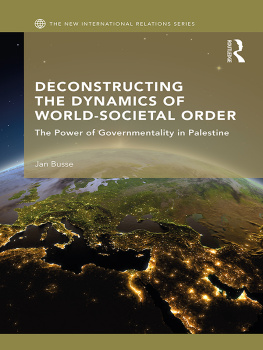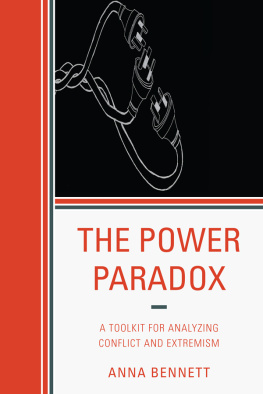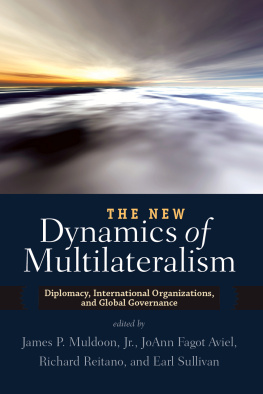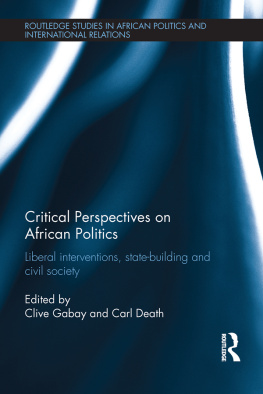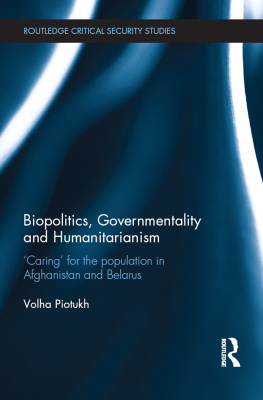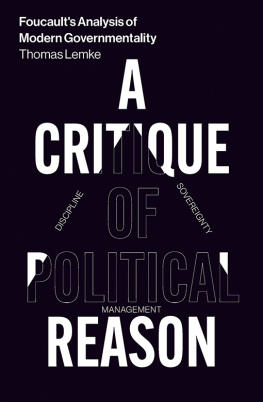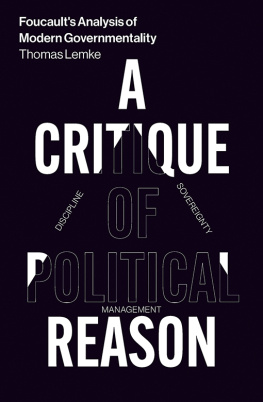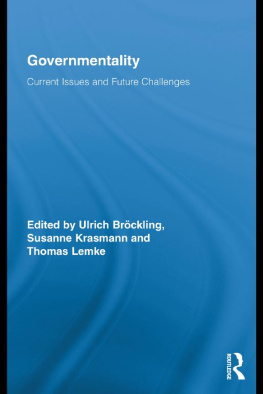In the vast field of literature on the Middle East in general, and on Palestine in particular, this book by Jan Busse is a gem. Rich in of understanding the local conditions, it shows how locality is inextricably woven into, and partly produced by, global context. This global context is analysed in a conceptually innovative fashion. This book is a must-read not only for every student of contemporary Palestine, but also for those interested in the uses of sociological approaches in understanding contemporary world affairs.
Mathias Albert, Bielefeld University, Germany
This volume addresses in an excellent way the growing number of calls for a stronger cross-fertilization between IR Theory and Middle East Studies and for disciplinary boundary crossing more generally. Based on an innovative theoretical framework that combines Foucaults notion of governmentality and the Stanford Schools sociological neo-institutionalism the volume not only contributes, in original ways, to our understanding of how order is constituted and power exercised in a Palestine embedded within the world society. It, furthermore, succeeds in showing why it is important to transcend prevalent but problematic dichotomies in the study of global politics, such as universalism/particularism, inside/outside, traditional/modern, local/global, and, not at least, how this can be done.
Morten Valbjrn, Aarhus University, Denmark
I was fascinated by the research undertaken by Jan Busse. This is an outstanding book that succeeds in what many publications in the field fail to do. Namely, to combine innovative theoretical reflection with rigorous empirical insights generated on the basis of intimate knowledge about a specific place. The book elegantly combines theories of world society and Foucauldian theory with an inspiring analysis of politics in Palestine. A must-read.
Stephan Stetter, Bundeswehr University Munich, Germany
Deconstructing the Dynamics of World-Societal Order
To get a better sense of power dynamics in global politics, this book presents an innovative theoretical framework, combining a critical engagement with, and further development of, Michel Foucaults governmentality on the one hand, and the theory of world society of the Stanford School of Sociology on the other.
Making an original contribution to academic debates about power and global political order, this book develops a comprehensive theoretical perspective on power relations and political dynamics. The book starts from the presupposition that any theoretical engagement of that kind requires nuanced empirical study as well. It therefore analyzes the dynamics of world-societal order in the concrete empirical example of Palestine, and raises the question of how its political and societal order comes into existence. The author argues that governmentality represents a fundamental pattern of political order in world society that also profoundly affects power dynamics in Palestine. This insight has two important implications: First, power relations do not follow dichotomous distinctions such as international/domestic or global/local, but manifest themselves within world society. Second, therefore, order that comes into existence in Palestine needs to be understood as world-societal order.
Offering a comprehensive understanding of power relations and patterns of political order(ing) embedded in world society, the book provides a deeper understanding of the complex dynamics that contribute to the political and societal order of Palestine. This book will be of interest to scholars and students of Middle East Studies, Palestine Studies, International Relations, International Political Sociology, International Relations Theory, Governmentality Studies, and Political Theory.
Jan Busse is a Senior Research Fellow and Lecturer at the Institute of Political Science at Bundeswehr University Munich, Germany.
The New International Relations
Edited by Richard Little, University of Bristol, Iver B. Neumann, Norwegian Institute of International Affairs (NUPI), Norway and Jutta Weldes, University of Bristol.
The field of international relations has changed dramatically in recent years. This new series will cover the major issues that have emerged and reflect the latest academic thinking in this particular dynamic area.
A full list of titles is available here: https://www.routledge.com/New-International-Relations/book-series/NEWIR
Nuclear Realism
Global Political Thought during the Thermonuclear Revolution
Rens van Munster & Casper Sylvest
The Politics of Globality since 1945
Assembling the Planet
Edited by Rens van Munster & Casper Sylvest
Evaluating Progress in International Relations
How do you know?
Edited by Annette Freyberg-Inan, Ewan Harrison and Patrick James
Russia and the Idea of Europe 2nd Edition
A Study in Identity and International Relations
Iver B. Neumann
Memories of Empire and Entry into International Society
Views from the European periphery
Edited by Filip Ejdus
Great Power Multilateralism and the Prevention of War
Debating a 21st Century Concert of Powers
Edited by Harald Mller and Carsten Rauch
De-Constructing the Dynamics of World-Societal Order
The Power of Governmentality in Palestine
Jan Busse
Deconstructing the Dynamics of World-Societal Order
The Power of Governmentality in Palestine
Jan Busse
First published 2018
by Routledge
2 Park Square, Milton Park, Abingdon, Oxon, OX14 4RN
and by Routledge
711 Third Avenue, New York, NY 10017
Routledge is an imprint of the Taylor & Francis Group, an informa business
2018 Jan Busse
The right of Jan Busse to be identified as author of this work has been asserted by him in accordance with sections 77 and 78 of the Copyright, Designs and Patents Act 1988.
All rights reserved. No part of this book may be reprinted or reproduced or utilised in any form or by any electronic, mechanical, or other means, now known or hereafter invented, including photocopying and recording, or in any information storage or retrieval system, without permission in writing from the publishers.
Trademark notice: Product or corporate names may be trademarks or registered trademarks, and are used only for identification and explanation without intent to infringe.
British Library Cataloguing in Publication Data
A catalogue record for this book is available from the British Library
Library of Congress Cataloging in Publication Data
Names: Busse, Jan, author.
Title: De-constructing the dynamics of world-societal order : the power of governmentality in Palestine / Jan Busse.
Other titles: Deconstructing the dynamics of world societal order | New international relations.
Description: Milton Park, Abingdon, Oxon ; New York, NY : Routledge, 2018. | Series: The new international relations | Includes bibliographical references and index.
Identifiers: LCCN 2017029596 | ISBN 9781138500624 (hardback) | ISBN 9780203712252 (ebook)
Subjects: LCSH: Palestine--Politics and government. | Political science--Philosophy.
Classification: LCC JQ1830 .B87 2018 | DDC 320.95694/2--dc23

